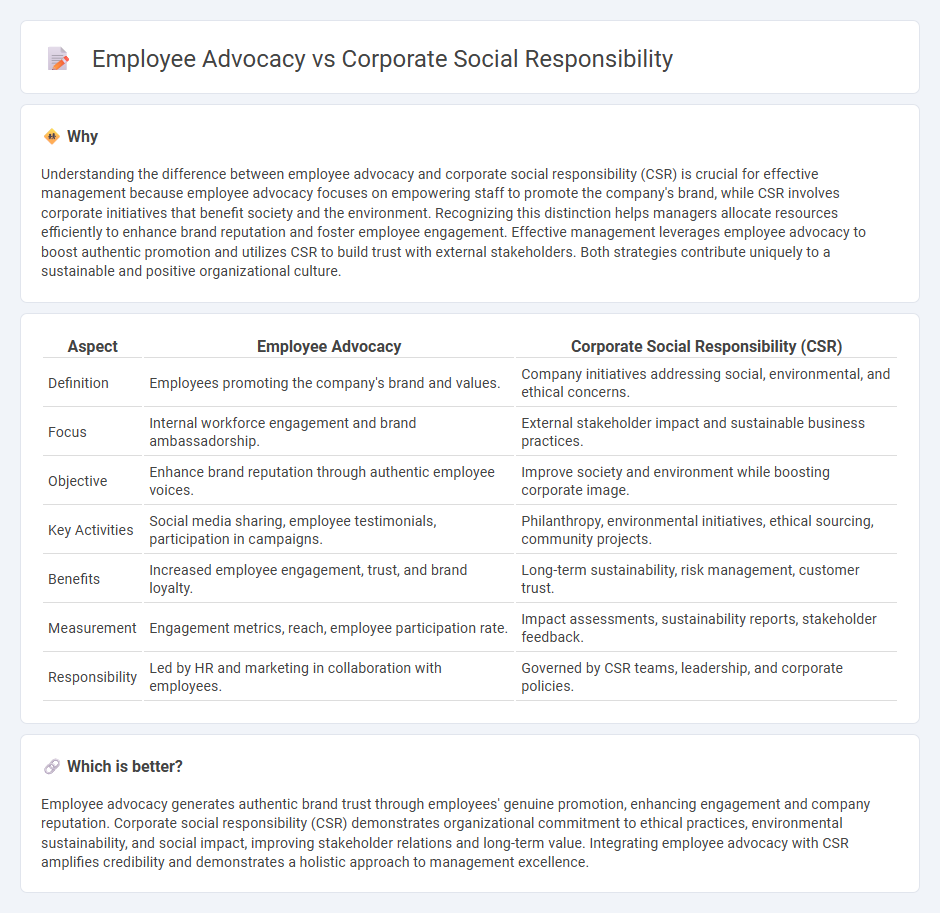
Employee advocacy empowers staff to authentically promote company values, enhancing brand credibility and customer trust. Corporate social responsibility focuses on a company's ethical obligations to contribute positively to society, improving reputation and stakeholder relations. Discover how integrating both strategies can drive sustainable business growth and social impact.
Why it is important
Understanding the difference between employee advocacy and corporate social responsibility (CSR) is crucial for effective management because employee advocacy focuses on empowering staff to promote the company's brand, while CSR involves corporate initiatives that benefit society and the environment. Recognizing this distinction helps managers allocate resources efficiently to enhance brand reputation and foster employee engagement. Effective management leverages employee advocacy to boost authentic promotion and utilizes CSR to build trust with external stakeholders. Both strategies contribute uniquely to a sustainable and positive organizational culture.
Comparison Table
| Aspect | Employee Advocacy | Corporate Social Responsibility (CSR) |
|---|---|---|
| Definition | Employees promoting the company's brand and values. | Company initiatives addressing social, environmental, and ethical concerns. |
| Focus | Internal workforce engagement and brand ambassadorship. | External stakeholder impact and sustainable business practices. |
| Objective | Enhance brand reputation through authentic employee voices. | Improve society and environment while boosting corporate image. |
| Key Activities | Social media sharing, employee testimonials, participation in campaigns. | Philanthropy, environmental initiatives, ethical sourcing, community projects. |
| Benefits | Increased employee engagement, trust, and brand loyalty. | Long-term sustainability, risk management, customer trust. |
| Measurement | Engagement metrics, reach, employee participation rate. | Impact assessments, sustainability reports, stakeholder feedback. |
| Responsibility | Led by HR and marketing in collaboration with employees. | Governed by CSR teams, leadership, and corporate policies. |
Which is better?
Employee advocacy generates authentic brand trust through employees' genuine promotion, enhancing engagement and company reputation. Corporate social responsibility (CSR) demonstrates organizational commitment to ethical practices, environmental sustainability, and social impact, improving stakeholder relations and long-term value. Integrating employee advocacy with CSR amplifies credibility and demonstrates a holistic approach to management excellence.
Connection
Employee advocacy amplifies corporate social responsibility (CSR) initiatives by engaging team members as authentic brand ambassadors who promote sustainable practices and ethical values. When employees actively support CSR efforts, companies experience enhanced reputation, increased trust, and stronger community relations. This alignment fosters a unified organizational culture that drives social impact and business performance.
Key Terms
Stakeholder Engagement
Corporate social responsibility (CSR) emphasizes engaging a wide range of stakeholders, including customers, investors, and communities, to promote ethical business practices and sustainable development. Employee advocacy narrows this focus, leveraging employees as authentic brand ambassadors to foster trust and deepen stakeholder relationships. Discover how aligning CSR and employee advocacy enhances overall stakeholder engagement and drives mutual value.
Ethical Leadership
Ethical leadership intertwines corporate social responsibility (CSR) and employee advocacy by promoting transparency, accountability, and genuine stakeholder engagement within organizations. CSR initiatives focus on sustainable business practices that benefit society, while employee advocacy leverages workers as brand ambassadors who embody and communicate these ethical values. Explore how fostering ethical leadership bridges CSR and employee advocacy to drive both social impact and organizational success.
Organizational Culture
Corporate social responsibility (CSR) emphasizes a company's commitment to ethical practices, sustainability, and social impact, shaping a positive organizational culture that aligns with broader societal values. Employee advocacy centers on empowering employees to represent and promote the company's mission, enhancing internal engagement and reinforcing a culture of trust and collaboration. Explore how integrating CSR and employee advocacy fosters a resilient organizational culture that drives long-term success.
Source and External Links
Corporate Social Responsibility (CSR): Guide & Examples - This webpage provides a comprehensive guide to corporate social responsibility, including its definition, examples, and impact on society.
Corporate Social Responsibility - Wikipedia - This article details the concept of CSR as a form of international private business self-regulation aimed at contributing to societal goals.
What Is Corporate Social Responsibility (CSR)? - This blog post explains CSR as a management concept that ensures a company's practices are ethical and beneficial for society, highlighting examples of impactful initiatives.
 dowidth.com
dowidth.com